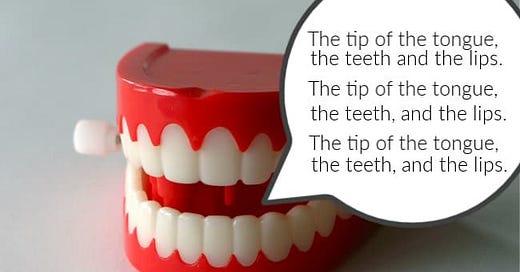Have the pronunciation police ever pulled you over to issue a warning?
'Madam, I've been listening to you, and I haven't understood a word you've said.
You've left off the 't' and 'd' at the ends of your words. 'I want to' blurred into 'I wanna' and I noted 4 instances where you transformed double 'tt' into 'dd'.
Repeat after me, 'mutter', 'stutter’... I do not want to hear, 'mudder' or 'studder'.
Unless you get that mouth of yours operating properly your speech will be permanently sidelined!'
Ouch.
Does it matter?
I think it does. Poor speech hinders communication. Clear speech helps it. If you've prepared a speech, surely you want your audience able to understand it?
You know you've been issued a warning if you've had feedback implying that you:
mumbled (spoke without opening your mouth sufficiently)
gabbled (spoke too quickly)
blurred or blended words together
Here's 3 tips to help banish the sloppy speech blues
1. Listen to yourself.
You'll never really know what others hear until you record yourself. Often what we 'think' we sound like and what we 'actually' sound like are two completely different things.
Make sure you capture a reasonable chunk of speech. You want enough for the natural self-consciousness of 'Oh my goodness, I'm recording myself.' to have subsided so that you can hear your habitual speech patterning.
Use that to decide your next steps. Is it articulation exercises to help with how you enunciate your words? Is work with rate of speech? (Use the links below for both of those.)
2. Practice articulation exercises.
Old-fashioned tongue twisters really do work. They'll force you to slow down and will transform lazy pronunciation.
Here are 36 good tongue twisters. (You’ll find a couple of audio clips too.)
3. SLOW down.
Often poor speech is the result of speed wobbles. The rate that your words rocket from your mouth is exceeding your skill to control and form them properly!
Tongue twisters will help the articulation of them but so too will slowing down.
There are suggestions here on how to slow or vary your speaking rate.
What do you think about how people speak? (Too fast, too slow, too mumbled and jumbled…) Does it have an impact on you? Do you notice it?
Until next time,
Happy speaking,
Susan
PS. If you found this beneficial, feel free to share it and click the ❤️ button so more people can discover it on Substack. 🙏Thank you.
PPS. As I said last week, and I’ll say next, if you have ideas for topics you’d like to see covered in this newsletter, or if you’d like to share an article on some aspect of public speaking, or a speech of your own, please get in touch. Either reply to this email or contact me through the form on my about me page on my website. I’d love to hear from you!




When hubbie & I are watching a TV program or movie on TV at home, we've both noticed the speech slurring of actors. You'd think they'd be among the last to have these habits. We have to rewind, turn up the sound, watch their mouth carefully & try to figure it out. As a last resort, turn on captions. (Our daughter uses captions quite frequently for the same reason.) Especially when we think what they said was pertinent to the story. They talk too fast, and/or too low. Maybe they don't teach elocution in acting class anymore?